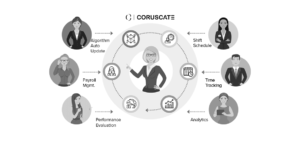MongoDB vs MySQL Faceoff: Why MongoDB Is Still Better Than Other Database For Your Business?

For decades, the relational databases took the leadership and at that time the choices were very common, either MySQL, MS SQL or Oracle. Though, these databases played a big role in developing enterprise applications, while today modern apps require much more scalability and diversity. Non-relations databases, like MongoDB appeared to fulfill such requirements and replace the traditional database environment.
MongoDB holds a good market share among the Its Database Management System competitors. A number of enterprises are switching towards the new database, such as MongoDB. Before we understand the advantages of choosing for such databases, let’s understand about what is MYSQL and MongoDB and their differences?
What is MySQL?
MySQL is an open-source relational database management system (RDBMS) that was developed by MySQL AB and then Oracle Corporation acquired it. MySQL stores data in tables that are arranged into a database, and uses Structured Query Language to access the data with commands such as “SELECT”, “UPDATE”, “INSERT” and “DELETE” to manage.
What is MongoDB?
MongoDB is an open-source, non-relational database program hat stores data as documents in a binary representation described BSON (Binary JSON). With the MongoDB query language, related information is saved together for fast query access.
Fields can change from document to document, and there is no need to declare the structure of documents to the system. If a new field requires to be included to a document, then the field can be generated without harming other documents in the collection, without changing a central system catalog, and without taking the system offline. Alternatively, schema validation can be done to implement data governance controls over each collection.
You come across many alternatives in the market to choose from the database, so how about checking out the difference between these two powerful solutions that are close in popularity?
Pros and Cons of MongoDB vs MySQL
These both databases are the most popular open-source database software for the business application. Let’s get started and see which is an ideal database for your business?
One of the greatest benefits of MongoDB is that there are no constraints on schema design. The developer can drop a some of the documents within a collection and it is not required to have any relations between documents. Though, the only drawback with this is supported data structures.
You need to continually optimize schema based on how the application will be accessing the data, because of the absence of joins and transactions.
Before you can store anything in MySQL, you need to clearly define tables, columns, and every row in the table should have the same column. And due to this, there isn’t much space for flexibility in the manner of storing data.
MongoDB builds schemaless documents which can store any information you want. However, sometimes it can create problems with data consistency. MySQL generates a strict schema-template and therefore it is bound to make errors.
Well, these both MySQL and MongoDB have a strong query language. Let’s compare one by one to understand.
MongoDB utilizes an unstructured query language. To construct a query in JSON documents, a document specification with properties is essential if you want the results to match.
MongoDB is executed using a set of operators that are associated with JSON. MongoDB operates property as having an implicit boolean AND. It supports boolean OR queries, though you should use operator ($or) to produce it.
Whereas MySQL works on the structured query language SQL to interact with the database. Despite the simplicity, it is certainly a very powerful language which holds two parts:
- Data Definition Language (DDL)
- Data Manipulation Language (DML)
MongoDB doesn’t support JOIN operation. On the opposite, it supports multi-dimensional data types such as arrays and other documents. The position of one document inside another is called as embedding.
While one of the best thing about MySQL is the JOIN operations. JOIN executes the relational database relational. JOIN enables the user to join data from two or more tables in a single query using SELECT command.
For instance, you can easily get related data in various tables using a single SQL statement.
MongoDB has the ability to control large unstructured data over MySQL. It is much faster because it allows users to query in a various manner that is sensible to workload.
You must know that MySQL is considerably slower in comparison to MongoDB when it is large databases. MySQL is helpless to face with large and unstructured amounts of data.
Well, there is no such “standard” benchmark that can help you with selecting the best database to utilize for your requirements. Only your needs, data and infrastructure can measure what you need to know.
Here’s a common example to understand the speed of MongoDB and MySQL in accordance with multiple functions.
Measurements have been implemented in the following cases:
- MongoDB 3.2.0
- MySQL 5.7.9
Both of these has been examined on a separate m4.xlarge Amazon instance with Ubuntu 14.4 x64 and configurations; all tests were conducted for 1,000,000 records.
MongoDB has a control with a flexible set of privileges. Security features of MongoDB are authentication, auditing and authorization.
Furthermore, it is feasible to use Transport Layer Security (TLS) and Secure Sockets Layer (SSL) for encryption ends. This assures that it is only available and readable by the intended client.
MySQL uses a privilege-based security model. This means it authenticates a user and helps it with user privileges on a particular database such as CREATE, SELECT, INSERT, UPDATE.
When to Use MongoDB or MySQL for Business?
MongoDB for Business Application:
High Availability: MongoDB helps when you require a high availability of data with automatic, fast and instant data recovery.
Sharding: if you are planning to grow big as MongoDB, then it has in-built sharding solutions.
Unstable Schema: If you have an unstable schema and you wish to reduce schema migration cost.
No DBA: If you don’t have a database administrator.
Cloud Computing: If your most of services are cloud-based, then MongoDB is suitable for you.
MySQL for Business Application:
Low Maintenance: If you are just at the beginning level and your database is not going to scale much, MySQL will help you in low-maintenance setup.
Budget Limit: If you are looking for high performance on a limited budget.
Fixed Schema: If you have fixed your schema and data structure is not going to change over the time such as Wikipedia.
High Transaction: If high transaction rate is going to be your requirement like BBC.
Data Security: If data security is your high priority then, MySQL is the secure DBMS.
Reasons to Move With MongoDB for Your Application
Every database works differently and built to fit your business challenges. Therefore depending on your organization’s requirement, MongoDB can be the best solutions compared to RDMS. So, after recognizing your database options, there are some elements that you should think.
- Your current architecture and network infrastructure.
- Want to pull data from a particular location?
- How much do you suppose your data to improve?
- Are you operating structured data from or you have a modern unstructured data?
Top Companies That Use MongoDB
According to idatalabs report, it is found that over 20,000 companies in the United States and Computer Software industry are using MongoDB as their database management system. It is most frequently used by firms less than 50 employees ranging 1 Million to 10 Million dollars in revenue.
MongoDB is flexible enough to fit any organizations. That’s the main reason for its popularity in many tech companies.
eBay has adopted MongoDB to handle a number of tasks that include a huge range of data. Such tasks are cloud management, search suggestions, metadata storage and merchandise categorization.
As effective search suggestion is main features of website database development, MongoDB contributes here a great support to offer better and quick suggestion to users.
Cisco is the global leader in networking, transforming how people connect, communicate and contribute. It had launched WebEx Social, an enterprise collaboration program designed for social, mobile, visual and virtual workforce.
A “Facebook for enterprises,” WebEx Social correlates people to the information and expertise they want. Users share knowledge and opinions during the enterprise, and across geographic and organizational barriers. When their existing relational database required a NoSQL extension to control the collaborative workspace, Cisco turned to MongoDB as their NoSQL database of choice.
MySQL is extremely organized for its versatility, high performance, secure data protection, and ease of managing data. Proper data indexing can fix your issue with performance, help interaction and assure robustness.
If you compare MongoDB speed vs MySQL, developers may get notice over a time that one lacks speed and experience challenges with larger data amount, so it would be a better choice for companies with smaller databases and looking for a general solution. Therefore, it is the best benefit of MongoDB over MySQL: the capability to face with a large and unstructured amount of data.
If you want to enhance your business with a great agility with MongoDB database services. Coruscate has a team of experienced, skilled web developers that hold proven record in successful project delivery using MEAN stack. Contact us with your idea and our representative will be in touch.








